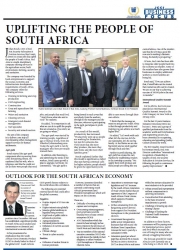
Dr Azar Jammine - Outlook For The South African Economy
‹ Back
Dr Azar Jammine - Outlook For The South African Economy
2018-09-14
Dr Azar Jammine, Director and Chief Economist of Econometrix, was the key note speaker at the JCCI’s 128th Annual General Meeting.
Jammine has been in his current position since December 1985 and has established a significant profile in South Africa as an analyst and commentator on domestic and international economic affairs.
In his presentation he emphasised that the South African Gross Domestic Product (GDP) is closely linked to that of the global GDP. South Africa’s GDP growth history relative to the world shows this correlation.
The following are potential external factors that could affect the global economy.
Negative:
-
Positive impact of US tax cuts to fade
-
Higher interest rates globally
-
Massive global additions to liquidity being reversed
-
High levels of public debt in advanced economies
-
Aging populations
-
Increased protectionism
-
Imbalance of current account deficits
-
Climate change
-
Threat to cyber security
Positive:
-
Diffusion of nuclear threat in Korean peninsula However, Jammine identified a number of factors that are currently confronting South Africa’s government (and President Ramaphosa), which will impact on the economy.
These are:
-
Difficulty of rooting out state capture and corruption
-
Overcoming mismanagement, poor governance and the financial woes of state-owned enterprises (SOEs)
-
ANC factionalism which has reared its head strongly (as has been evident in the provinces of North West and KwaZulu-Natal)
-
Top six members of the national executive committee (NEC) who are split down the middle in their allegiance to either President Cyril Ramaphosa or Nkosazana Dlamini Zuma
-
Opposition to minimum wage legislation and VAT increase by the South African Federation of Trade Unions (Saftu) that are opponents of the Congress of South African Trade Unions which supports President Ramaphosa
-
Strikes emanating from the bargaining power derived from support for President Ramaphosa in the presidential election
-
Government has agreed to public sector remuneration increases that will exceed the Medium Term Expenditure Forecast for next 3-years by a cumulative R30bn
-
Education spend per school pupil has declined 8% in Rands (R17822 in 2010 to R16435 in 2017) or about 40% in real terms whilst free tertiary education for most students is to be provided
-
Debate around land expropriation without compensation is deterring investment
-
Focus diverted from attending to the basic structural impediments to growth
-
Challenge of drawing up a new Mining Charter
-
Challenge of funding the National Health Insurance (NHI) scheme
In addition to these factors, consumers will be paying more for municipal services, petrol and food which increase the cost of living for many who are already struggling financially.
The forecast growth for South Africa’s GDP currently sits at 1.4% rising to 1.8% in 2019.
